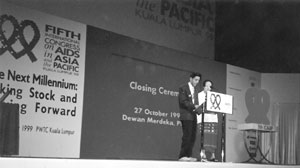 I have been living with HIV for the last five years. I went public with this exactly one year ago, on 1 December 2000, World AIDS Day. It was a difficult decision, but I decided that by coming out in the open I could help spread the message about this disease much more effectively, and also prove that infected people are not sick people on the verge of death.
I have been living with HIV for the last five years. I went public with this exactly one year ago, on 1 December 2000, World AIDS Day. It was a difficult decision, but I decided that by coming out in the open I could help spread the message about this disease much more effectively, and also prove that infected people are not sick people on the verge of death. Today, I have a viral load of 2,600 and a 300 CD4 cell count. This is not too bad, but it does get worse when I am stressed and don't get any sleep. But I don't get much sleep usually, because my advocacy work requires me to be on the Internet a lot, and since I don't have money for an email connection, a friendly cybercaf? allows me to get on the Internet there after ten at night.
Since I came out, I have been able to help friends, and even people I didn't know, with advice and counselling. I went to Accham to train volunteers to spread awareness about HIV. Because there are so many people who have returned from India who are positive, AIDS is popularly called a "Bombay disease". And here in Kathmandu I have seen so many children of well-off parents who are getting infected. It is not who you are, but what you do that puts you at risk.
In my experience, the impression that people with HIV are discriminated against by the Nepali public is exaggerated. Personally, I have found nothing but sympathy from relatives, friends and even total strangers here and abroad, with their care and love.
A few days after I got the results of my blood test in 1998, I got accepted to study in Denmark. While there, they made a television film about me called Life under a ribbon, which will soon be shown on Danish TV-it shows how I adjusted to my life as a Nepali person with HIV in a co-ed school.
Now that I have appeared on radio, television and in the media, there are a lot of people-people in Kathmandu and Nepalis in Australia and Malaysia-who call and write to me. I tell them what they need to do, about the retroviral treatment available. They now know more about the disease, the ways in which a person can get infected, what to do to safeguard yourself, and the importance of giving infected people care and support.
Nepal is facing an enormous challenge. Every day 14 people are getting infected by the virus. There are many government and non-government organisations working in prevention. Millions of dollars are being put into different projects. Seminars, international conferences take place every now and then followed by cocktail receptions. A lot of reports are written, but the situation is getting worse. This does not make much difference to those who are not infected, since they have many years to come to make things better, but for us every day counts. We don't want to just wait to die.
I have been one of the lucky HIV-positive people to work on advocacy and awareness both within Nepal and outside. I have a big responsibility on my shoulders and have been able to contribute to an extent. The irony is that my own country is one of the hardest hit and I am powerless since there are not many who are willing to listen to me. Without care and support for people living with HIV, no matter how much money or effort is put in, the problem will get worse. At present, very few organisations are providing care to infected people. Around 100 Nepalis with HIV are being provided direct support. What, I wonder, are the other 39,900 Nepalis going through?
There is an urgent need to set up hospices for care of infected people, because home-based care is not suitable for Nepal. There are many young men with HIV right here in Kathmandu who have nowhere to go. There is also an urgent need to find injecting drug users access to life-saving tools such as clean needles and methadone. Our government must recognise that needle-exchange works.
Some of the most important and immediate measures that the government and concerned individuals and organisations should take are very basic-such as providing access to proper medical services, access to medication, care and support programs to those who have no place to go, laws to protect the rights of infected people, empowerment and skill development programs, projects to rehabilitate them in the community. If they cannot do that, they should stop using our misfortune for their own selfish ends.
As people with HIV and AIDS, we do not want sympathy, we do not want tokenism and we certainly don't want prejudice. All across the region, we see people dying every day. Care for people living with HIV and AIDS may not have to be treatment in the most technologically advanced environment with the latest anti-retrovirals. It could be the most basic of needs: a home to live and die with dignity.
(Rajiv Kafle is a board member representing the Asia-Pacific in the Netherlands-based Global Network of People Living with HIV/AIDS, GNP+.)


